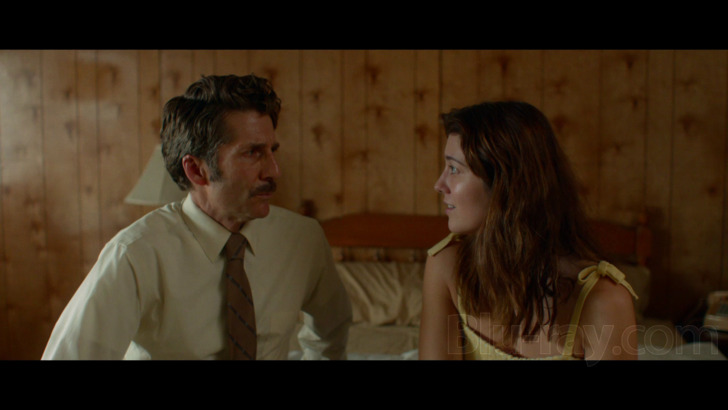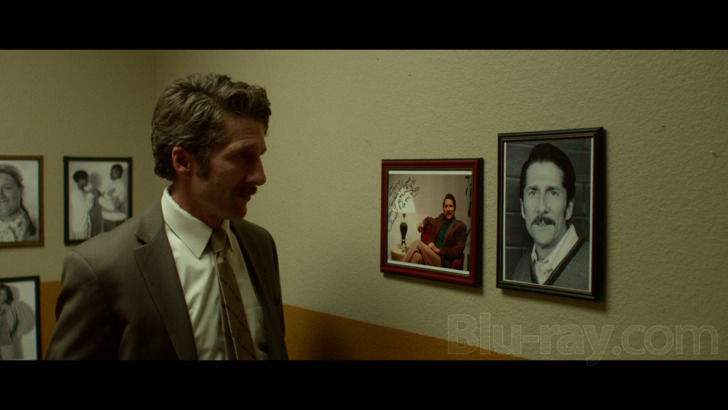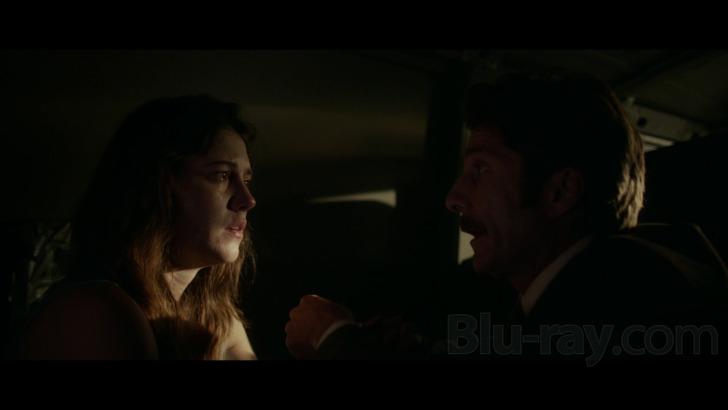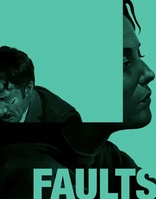Faults Blu-ray Movie
HomeFaults Blu-ray Movie 
Slipcover in Original PressingYellow Veil Pictures | 2014 | 90 min | Not rated | Sep 27, 2022
Movie rating
6.9 | / 10 |
Blu-ray rating
| Users | 0.0 | |
| Reviewer | 4.0 | |
| Overall | 4.0 |
Overview
Faults (2014)
Claire is under the grip of a mysterious new cult called Faults. Desperate to be reunited with their daughter, Claire's parents recruit one of the world's foremost experts on mind control, Ansel Roth.
Starring: Leland Orser, Mary Elizabeth Winstead, Chris Ellis, Jon Gries, Lance ReddickDirector: Riley Stearns
| Drama | 100% |
Specifications
Video
Video codec: MPEG-4 AVC
Video resolution: 1080p
Aspect ratio: 2.35:1
Original aspect ratio: 2.39:1
Audio
English: DTS-HD Master Audio 5.1
English: Dolby Digital 5.1
English: Dolby Digital 2.0
Subtitles
English SDH
Discs
Blu-ray Disc
Single disc (1 BD)
Packaging
Slipcover in original pressing
Playback
Region A, B (C untested)
Review
Rating summary
| Movie | 3.0 | |
| Video | 3.5 | |
| Audio | 4.0 | |
| Extras | 4.0 | |
| Overall | 4.0 |
Faults Blu-ray Movie Review
Reviewed by Brian Orndorf September 3, 2022Throughout his career, actor Leland Orser hasn’t made much of an impression. He was hit with typecasting for a long time, always the go-to guy to play twitchy, screechy types on the verge of a nervous breakdown. He’s been wallpaper as well, playing one of the background characters in the “Taken” trilogy. “Faults” is the first truly substantial Leland Orser performance I’ve seen, asking more of the man than other productions would, and he’s up for the challenge, providing a riveting depiction of frayed respectability and financial desperation colliding with professional responsibility. “Faults” is lucky to have such an unusual presence, as the rest of Riley Stearns’s directorial debut tends to deflate when he’s not around.

After building a reputation as an expert on mind-control and the possession of cults, Ansel (Leland Orser) has lost his way, reduced to cheating on restaurant bills and conducting sparsely attended lectures in hotel conference rooms. Almost at rock-bottom, Ansel is hired by Evelyn (Beth Grant) and Paul (Chris Ellis) to help with their daughter, Claire (Mary Elizabeth Winstead), who’s joined a cult known as Faults, abandoning all rational thought. Agreeing to a job of deprogramming, Ansel sets up a hotel room for a five-day mental cleanse, holding Claire inside as the two feel out a dialogue that covers her concept of reality, sharing her wish to attain a higher “level” of life that brings her closer to God. While Ansel uses every weapon in his intellectual arsenal to break Claire, he’s powerless to debt, with manager Terry (Jon Gries) coming after him for money owed after a self-publishing book deal goes south.
“Faults” makes a critical error by peaking too soon. The best scene of the film is also its first scene, where we meet Ansel sitting alone in a restaurant booth, hurriedly munching away as his bill arrives. Handing the waiter a previously used voucher, the situation quickly turns ugly, triggering the thinning patience of the manager and Ansel’s practiced defiance, reduced to eating ketchup off a plate to claim victory over these hotel employees. Within five minutes, Stearns defines Ansel to perfection, spotlighting a desperate man comfortable pushing confrontation all the way to explosion, with the resulting humiliation merely a taste of the man’s daily diet of failure. It’s a terrific commencement to “Faults,” underlining pure character and reaction, while establishing Stearns’s ability to conjure tension with a minimalist approach, clearly channeling the work of Paul Thomas Anderson.
Alas, “Faults” doesn’t remain in the restaurant, soon transporting over to a dingy hotel room, where Ansel and Claire begin a series of conversations meant to identify the clutch of the cult and its philosophy concerning the next stage of existence. There are monologues and long periods of stillness, with Stearns working to generate a claustrophobic sense of the room, playing with locked doors and nocturnal activities, keeping Claire a mysterious figure who considers invisibility a possibility and rejects everything about her former life. Taking up residence in the next room are her parents, who contribute to Claire’s regression by dressing her up in clothes she owned as a teenager, adding to the unsettled atmosphere of the week as Ansel attempts to rebuild their bridge of communication.
“Faults” contains select scenes that capture the intriguing back and forth between Claire and Ansel, while the overall effort comes off as a short film that’s been stretched to feature-length standards. Additional strife is introduced with Terry, who’s out to reclaim missing money, sending Ansel into a panic, turning to Claire’s parents for an advance on work that doesn’t seem legitimate, adding to the pressure of the week. While “Faults” seems packed with incident, little is accomplished during the movie, which often registers as a one-act play highlighting a show of force between the lead characters, watching Claire begin to open Ansel’s mind to the captivity of his own cult: money.
Faults Blu-ray Movie, Video Quality 

The AVC encoded image (2.35:1 aspect ratio) presentation does well with color, preserving the muted palette, with favors the paneled browns of the hotel room and the darker hues on costuming. Skin tones are natural. Lighting sources retain their golden glow. Detail offers a decent look at facial particulars, exploring differences in age and physical harm. Decorative additions are also passably defined. Delineation is satisfactory. Encoding has issues, with ocassional blockiness.
Faults Blu-ray Movie, Audio Quality 

The 5.1 DTS-HD MA mix secures crisp dialogue exchanges, offering a comfortable balance between calm acts of communication and more heated encounters. Music isn't part of the listening experience, as the feature favors the rare use of low synth to add some aural pressure to moments, which offers some low-end presence. Surrounds are rarely used, but some atmospherics are appreciable.
Faults Blu-ray Movie, Special Features and Extras 

- Booklet (18 pages) contains a conversation between writer/director Riley Sterns and filmmaker Alex Ross Perry.
- Introduction (1:31, HD) offers a welcome to the Blu-ray experience from writer/director Riley Sterns.
- Commentary 2022 features writer/director Riley Sterns, editor Sarah Beth Shapiro, and cinematographer Michael Ragen.
- Commentary 2015 features writer/director Riley Sterns and actors Leland Orser and Mary Elizabeth Winstead.
- "Deprogramming 'Faults'" (29:26, HD) is an interview with podcaster Lola Blanc.
- "Reprogramming 'Faults'" (7:48, HD) is an interview with writer/director Riley Sterns.
- "The Cub" (4:52, HD) is a 2012 short film by Riley Sterns.
- Photo Gallery (5:35) collects BTS snaps.
- And a Theatrical Trailer (2:08, HD) is included.
Faults Blu-ray Movie, Overall Score and Recommendation 

"Faults" is provocative in spurts, but it's never steady in its inspection of mental health, leading to a general dimming of drama in a vastly unsatisfying third act. Stearns promises confrontation, but he delivers "The Twilight Zone." Intensity is salvaged by Orser, who plays boiling frustration with rare depth, preserving Ansel's unpredictability. He's a bright spot in a promising picture, but one that's in need of a little more activity to keep its characters genuinely busy, and not just indie film action figures waiting patiently for the inevitable payoff of violence.
Similar titles
Similar titles you might also like

Monos
2019

The Ones Below
2015

Always Shine
2016

The Kid with a Bike
Le gamin au vélo
2011

Secret Sunshine
밀양 / Milyang
2007

Beasts of No Nation
2015

The Informers
2008

La Bête Humaine
1938

Pieta
피에타
2012

Lost Soul: The Doomed Journey of Richard Stanley's Island of Dr. Moreau
House of Pain Edition
2014

Across the Line: The Exodus of Charlie Wright
2010

Last Embrace 4K
Standard Edition
1979

The Servant
1963

Cul-de-sac
1966

Krisha
Signed Limited Edition to 100 Copies - SOLD OUT
2015

The Third Murder
三度目の殺人
2017

Omar
2013

The Virgin Spring
Jungfrukällan
1960

Lady Vengeance
Sympathy for Lady Vengeance | Ultimate Revenge Edition | 친절한 금자씨
2005

Bullhead
Rundskop
2011

